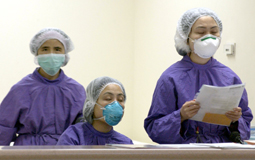
|
| Ready for battle: A continuous supply of protective gear has been assured for frontline medical staff fighting atypical pneumonia. |
The Central Government has agreed to provide protective gear as part of its support for Hong Kong in the fight against atypical pneumonia.
Secretary for Health, Welfare & Food Dr Yeoh Eng-kiong said the gear includes 400,000 protective gowns, 200,000 goggles and a million face masks.
Meanwhile, the Government will closely monitor the supply of facilities and equipment and seek assistance from the Central Government when necessary to maintain continuous supply.
Replying to a question from Michael Mak in the Legislative Council today, Dr Yeoh said Hong Kong and Guangdong have agreed to:
* Further improve the notification mechanism for infectious atypical pneumonia;
* Exchange regularly the latest information on the disease;
* Set up a point-to-point exchange mechanism between counterpart organisations to enhance communication and to draw on each other's experience in disease control; and,
* Expand the existing scope of information exchange on infectious diseases by including cholera, dengue fever, malaria, influenza and tuberculosis to facilitate control and prevention.
Dr Yeoh said the Government will seek the LegCo Finance Committee's approval to allocate additional funds on top of the $200 million already approved to support the virus fight.
"We are carefully monitoring the funding requirements, and shall seek the approval of Finance Committee for additional funding in the near future," he said.
Turning to the case definition for SARS in Hong Kong, Dr Yeoh said the Department of Health and the Hospital Authority have followed closely the definition adopted by the World Health Organisation and taking into account the local situation.
The exclusion criteria adopted in Hong Kong are the same as those of the WHO, in that a case should be excluded if an alternative diagnosis can fully explain the illness.
Responding to Ma Fung-kwok's question on the release of information, Dr Yeoh said latest data is released through daily briefing sessions and the department's website.
Consulates and the International Business Committee are also kept abreast of the latest developments, while Hong Kong's overseas Economic & Trade Offices brief their host economies.
He said the information dissemination mechanism will be regularly reviewed.
|